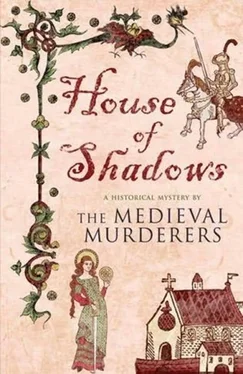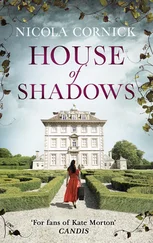‘Come in, come in,’ hiccuped Castell. ‘I would offer you wine, but I have just finished it.’
‘Why does that not surprise me?’ muttered Browne, making no move to enter. His horse, sensing his unease, began to prance. Tivill struggled hopelessly to control it, while Walduck sniggered at his shipmate’s ineptitude. Then Browne heard footsteps hurrying towards them, coming from the direction of the darkened grounds.
‘Walduck,’ snapped Browne, furious when the cooper made no effort to defend his captain but continued to laugh at Tivill. ‘Your two shillings is set to become nothing, unless you tend to your duties. Draw your sword, man, and be ready to fight.’
‘There is no need for that,’ said Castell soothingly, while Walduck glowered resentfully at the reprimand. ‘We are all friends here – you do not need men to protect you.’
‘I shall make up my own mind about that, thank you,’ snarled Browne. He squinted into the darkness, hand on the hilt of his sword, as he tried to see what kind of person was approaching. The figure came closer, revealing itself to be short, plump and obsequious. It wore a tight-fitting long-coat that was absurdly out of date and a wide-brimmed hat with a feather stuck in it, as if the man imagined himself to be a youthful Cavalier. Browne felt his jaw drop in astonishment as he recognized the fellow. ‘Jesus wept! Is that Thomas Strutt?’
Walduck was equally shocked, chagrin forgotten. ‘It is! Our old purser, God rot his thieving soul!’
‘Shall I run him through?’ asked Tivill, abandoning the horse to draw his sword with one hand and a dagger with the other. His eyes gleamed at the prospect of violence. ‘He supplied Rosebush with rancid meat and stale biscuits last year, and we had no choice but to eat them.’
Walduck shuddered at the memory. ‘ And he cheated us over gunpowder. He said we had thirty barrels, but there were only ten – and the lie almost saw us killed when we met them Dutch pirates.’
They were right, and Browne’s misgivings about the night’s venture intensified. Hay probably did need all the men he could get to help him remove the king and his government from power, but surely he knew better than to recruit a dishonest, unreliable fellow like Strutt? Rosebush ’s old purser would sell his own mother for a cup of wine, so would think nothing of betraying would-be conspirators. Abruptly, Browne decided he wanted no more to do with Bermondsey House and its secrets.
‘There has been a misunderstanding,’ he said to Castell. He turned towards his horse. ‘I should not have come here tonight – I would not, had I known villains like Strutt were involved.’
Strutt started to object to the insult, but someone emerged from the shadows near the door, where he had been listening unseen. William Hay, owner of the Hay’s Wharf Company, was a small, neat man, who wore a massive yellow wig – a headpiece almost large enough to verge on the ridiculous. His clothes were made of dark red satin, cut tight to the waist to show off his figure and then flaring out into a froth of lace and frills around his knees. His shoes were small, buckled and elegant, and as far from Browne’s practical riding boots as it was possible to be.
‘You should hear what I have to say before you leave, captain,’ he said softly. ‘It will be worth your while, I promise. Come, the others are waiting.’
Against his better judgement, Browne followed Hay along a weed-infested path that skirted the house’s east wing. The two sailors were at his heels, and Strutt trailed behind them; it was too dark to see whether Castell or his grandmother had joined the procession. Tivill was again trying to soothe the agitated horse, although with scant success, because he was attempting to do it without sheathing either of his weapons. Walduck was scowling, because the purser’s unexpected appearance had put him in a black and dangerous mood.
At a point where the shadows were thickest, Hay opened a door to reveal a flight of steep, slime-coated stairs. Browne balked. He disliked enclosed spaces, and a cellar was not his idea of a suitable place for a meeting, seditious or otherwise. Anger began to replace nervousness. He was damned if he was going to be enticed underground in company with the likes of Thomas Strutt. He glanced behind him and saw other figures beginning to converge on the door, too, all cloaked and hooded. Evidently, other conspirators were beginning to assemble.
‘I have had enough,’ he snapped, his nerve – and temper – finally breaking as he backed away. ‘Good night, Hay. Do not contact me again.’
Suddenly there was a sharp crack, and he felt himself stumble, although there was no pain. He was aware of falling to the ground and of blurred, indistinguishable voices echoing around his head. He tried to open his eyes, but all he could see was blackness. Then the voices faded, and he knew nothing at all.
Late June 1663
Thomas Chaloner, spy for the Lord Chancellor of England, was pleased when Captain Browne’s widow provided him with an excuse to leave London for a few days. The weather was unseasonably hot, and the city’s sewage-splattered streets baked and sizzled under an unrelenting sun. Streams and brooks ran dry, tar melted on the ships moored along the Thames, and Chaloner’s attic rooms in Chancery Lane were like tiny furnaces. The Lord Chancellor was preoccupied with weighty affairs of state and barely looked up from his paper-strewn desk when Chaloner asked if he might spend a few days across the river on business of his own. He waved a chubby, lace-fringed hand, and said Chaloner could do what he liked, just as long as it did not involve another interruption.
So Chaloner packed a bag and left the sweltering metropolis for the cooler pastures to the south. Or so he thought. He soon learned that Bermondsey was every bit as torrid as the city, and because its inhabitants also used their streets as sewers and rubbish dumps there was no improvement on the stench, either. Furthermore, the reek of urine-soaked hides from Bermondsey’s tanneries was pungent enough to make his eyes water and mingled unpleasantly with the more earthy aroma of heat-spoiled beer from the riverside breweries.
While he walked, Chaloner thought about Hannah Browne. They had met when Hannah had accompanied her husband on one of his voyages, and Chaloner had been a passenger, en route to one of his overseas assignments. Ships demanded a lot of time from their captains, so Hannah was bored and had often sought out Chaloner’s company. To pass the time, he had taught her to play the flageolet, though she had never been very good at it. Browne had been delighted with her new skill, though, and had encouraged her to play for him almost every night. It had revealed a softer, more attractive side to that cruel and uncompromising man.
Hannah Browne’s letter had asked Chaloner to meet her at Jamaica House, a large, rambling inn with its own bowling green. He pushed open the door, then waited for his eyes to adjust from bright sunlight to the dimness of the room within. Although the window shutters had been thrown open in the vain hope of catching a cooling breeze, the tavern remained dark and gloomy. It smelled of spilled ale, smoke from its patrons’ pipes, and sweaty, unwashed bodies.
Chaloner spotted Hannah immediately. She was sitting near the empty hearth, fanning herself with one of the newsbooks that had been left on the tables for customers to read. It warned loyal citizens about the threat of a new Parliamentarian uprising, although no one in Jamaica House seemed overly concerned about the notion of rebellion. Chaloner could not help but notice that the government’s official publications had been variously used as beer mats, wedges to combat wobbly tables, and even as a plate for the large pig that obligingly disposed of any leftover food.
Читать дальше












